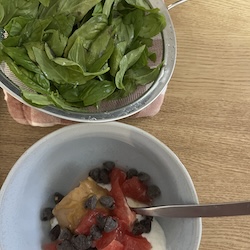Discover how hormonal contraceptives can deplete essential nutrients and learn practical dietary strategies to restore balance. Explore tips for optimizing your health naturally.
Many doctors—OBGYNs, endocrinologists, dermatologists—commonly prescribe hormonal contraceptives (HCs) to address irregular cycles, hormonal imbalances, manage acne, or as a method of birth control. While these medications can be effective, they often come with side effects—some well-known and others less commonly discussed. Women may experience changes in weight, spotting, or mood shifts while using HCs, and similar adjustments often occur when discontinuing them.
In today’s world, hormonal contraceptives are one of the most common solutions for pregnancy prevention. However, a lesser-known irony is that HCs can deplete key nutrients—nutrients essential for overall health and fertility. This can leave the body unprepared when transitioning off birth control to start the TTC (trying to conceive) journey.
Nutritional strategies are critical both during and after using HCs. Addressing potential nutrient deficiencies can help minimize side effects and support the body’s transition off these medications, setting the stage for optimal fertility and well-being.
This blog explores the connection between hormonal contraceptives and nutrient depletion, highlights common signs of deficiency, and offers guidance on how a nutrient-dense diet can help restore balance.

In true Dining With Nature fashion, we encourage prioritizing nourishment through whole foods. If supplements are needed, it’s essential to discuss this with your healthcare provider. Here are the most common nutrient deficiencies linked to HCs, along with tips to ensure adequate intake while on or off them:
1. Vitamin B6 plays a crucial role in brain health, mood regulation, and energy production. A deficiency in B6 may manifest as irritability, depression, or fatigue. To boost your B6 intake, include foods like bananas, chickpeas, salmon, and whole grains in your diet. For a simple meal idea, add salmon to your weekly lunches or dinners as a protein source. For a snack or breakfast option, try slicing a banana into yogurt, adding a dollop of peanut butter, and sprinkling on some granola.
2. Folate is essential for cell growth, including red blood cell formation, and plays a critical role during pregnancy in supporting neural tube development. A deficiency in folate can cause fatigue, anemia, and poor concentration. To ensure adequate folate intake, include foods like spinach, kale (leafy greens), lentils, and citrus fruits in your meals. Try sautéing leafy greens for breakfast, using them as the base for your lunch salad, or enjoying a grapefruit or orange as a refreshing midday snack.
3. Vitamin B12 is vital for DNA synthesis, red blood cell production, and nerve health. It also plays a key role in energy metabolism and overall well-being. Signs of a B12 deficiency may include fatigue, weakness, numbness or tingling in the hands and feet, anemia, and memory issues. The best sources of B12 are animal products such as meat, poultry, eggs, fish, and dairy. Plant-based sources are limited, but supplementation or fortified foods like nutritional yeast can help. For a simple way to boost your B12 intake, try incorporating eggs into your savory breakfast or adding a piece of grass-fed beef to your hearty dinner.
4. Vitamin B2, also known as riboflavin, is essential for energy production, nutrient breakdown, and maintaining the health of your skin, eyes, and nervous system. Although deficiency is rare, inadequate intake can lead to symptoms like cracked lips, a sore throat, irritated eyes, and scaly skin. Good sources of B2 include dairy products, eggs, lean meats, green leafy vegetables, and nuts. For a nutrient-packed snack, try homemade kale chips as a crunchy treat during movie time, or enjoy a handful of nuts with some grapes as a pre-workout energy boost.
5. Vitamin D is essential for numerous bodily processes, particularly bone health and immune function. Deficiency in vitamin D is common and can manifest as fatigue, mood swings, and bone pain. Vitamin D is naturally found in foods like fatty fish, fortified dairy products, and egg yolks. Additionally, sunlight exposure is a key source—aim to expose your arms and legs to sunlight without sunscreen for up to 10 minutes per day, depending on your skin type and location.
6. Vitamin A is essential for vision health, maintaining skin integrity, and supporting the immune system. It also plays a vital role in cell growth and keeping the heart, lungs, and other organs healthy. Many people don’t get enough vitamin A, which can lead to symptoms like dry eyes, night blindness, a weakened immune system, and dry skin.
Vitamin A comes in two forms:
- Retinol (preformed vitamin A): Found in animal sources like liver, eggs, dairy, and fish.
- Beta-carotene (provitamin A): Found in plant-based foods like red and orange vegetables (e.g., carrots, sweet potatoes, bell peppers) and leafy greens such as spinach.
For a nutrient-dense meal, try incorporating liver into your meat-based dishes and serving it with a side of roasted sweet potatoes.
7. Zinc is a trace mineral that plays a critical role in the body, particularly in boosting immune function and supporting skin health. Signs of zinc deficiency include acne, frequent colds or illnesses, and slow wound healing. Good sources of zinc include oysters, beef, chickpeas, and cashews. For an easy way to increase your intake, try a hummus dip with crackers as a meal starter or sprinkle chopped cashews over your salad for added crunch.
Additionally, HCs can increase levels of copper, iron, calcium, and cadmium
The irony of hormonal contraceptives (HCs) is that many of the nutrients they deplete are essential for fertility health. After discontinuing HCs, it takes time to replenish these nutrients to optimize fertility and prepare the body for pregnancy.
Dietary Strategies to Address Nutrient Deficiencies
1. Colors colors colors! Aim to “eat the rainbow” by including a wide variety of colorful fruits and vegetables in every meal and snack. This ensures you get a diverse range of vitamins, minerals, and antioxidants.
2. Opt for whole, fresh, minimally processed ingredients: Focus on nutrient-dense foods like fruits, vegetables, starchy vegetables, whole grains, high-quality proteins, and healthy fats to maximize your nutrient intake.
3. Incorporate probiotics daily: Support your gut health by eating fermented foods like yogurt, kefir, and miso. Pair these with fiber-rich prebiotic foods to strengthen the gut microbiome, enhance nutrient absorption, and support hormone health.
4. Discuss supplementation with your healthcare provider: If nutrient deficiencies are significant or you’re trying to conceive (TTC), supplementation might be necessary. Always consult with your healthcare team before starting supplements.
Sample Meal Plan for Nutrition Improvement on or after HC
- Breakfast: Spinach and mushroom omelet with a side of full-fat greek yogurt and berries
- Lunch: Bowl of lentil chili with grass-fed beef and carrots, celery, onions, and zucchini, sliced avocado on top.
- Snack AM: Grapes, almonds, soft mozzarella cheese, and a few pieces of 70% dark chocolate
- Snack PM: Grass-fed beef liver pate with flax crackers
- Dinner: Grilled salmon with a side of roasted broccoli and sweet potatoes
While hormonal contraceptives offer many benefits, they may affect your nutrient levels. By understanding these potential deficiencies and adopting a nutrient-focused diet, you can restore balance and maintain optimal health.
To learn more about what Dining With Nature offers for fertility nutrition care – hit the Explore The DWN Programs button below or take a look at our Services page.

